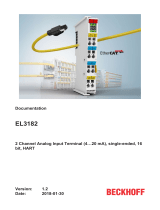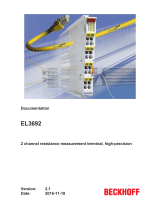Page is loading ...

Version 1.2
Date: 2018-12-13
EtherCAT Evaluation Kit
Workshop – Installation Guide

II Installation Guide
LEGAL NOTICE
Trademarks
Beckhoff®, TwinCAT®, EtherCAT®, Safety over EtherCAT®, TwinSAFE® and
XFC® are registered trademarks of and licensed by Beckhoff Automation GmbH.
Other designations used in this publication may be trademarks whose use by third
parties for their own purposes could violate the rights of the owners.
Patent Pending
The EtherCAT Technology is covered, including but not limited to the following
German patent applications and patents: DE10304637, DE102004044764,
DE102005009224, DE102007017835 with corresponding applications or
registrations in various other countries.
Disclaimer
The documentation has been prepared with care. The products described are,
however, constantly under development. For that reason the documentation is not in
every case checked for consistency with performance data, standards or other
characteristics. In the event that it contains technical or editorial errors, we retain the
right to make alterations at any time and without warning. No claims for the
modification of products that have already been supplied may be made on the basis
of the data, diagrams and descriptions in this documentation.
Copyright
© Beckhoff Automation GmbH 05/2009.
The reproduction, distribution and utilization of this document as well as the
communication of its contents to others without express authorization are prohibited.
Offenders will be held liable for the payment of damages. All rights reserved in the
event of the grant of a patent, utility model or design.

Installation Guide 1
DOCUMENT HISTORY
Version
Comment
0.1
First version
0.2
Compiler Suite selection added
1.0
MPLAB X related information added
1.1
Add Excel and Wireshark requirement
1.2
Remove old tool instructions (Only development board EL9800_6A shall be used)

2 Installation Guide
CONTENTS
1 Introduction 3
2 EL9800 Hardware Revision 4
3 Installation – Slave Stack Code 5
3.1 Vendor ID 5
3.2 .NET Framework 5
3.3 SSC Source Files + Tool 5
4 MPLAB X 7
4.1 Compiler Installation 7
4.2 IDE Installation 7
4.3 USB driver and test of the communication 8
4.4 Create a new Project 10
5 Installation - TwinCAT 14
5.1 TwinCAT development environment + runtime 14
5.2 Real-Time Ethernet Driver 16
5.3 Test of the communication 18
6 Installation - Additional Tools 21

Installation Guide 3
1 Introduction
In order to properly operate with the Beckhoff EL9820 Evaluation Kit, the installation of three following
software packages is needed:
Slave Stack Code (SSC): source code (written in C programming language) implementing all
general-purpose functionalities of an EtherCAT Slave as well as some application examples.
MPLAB IDE for Microchip PIC (+ MPLAB XC 16 Compiler for PIC24): development
environment for the programming and debugging of the Microchip PIC24 microcontroller
integrated on board the EL9800 Evaluation Kit
TwinCAT Real-Time Control Suite: PC-based control platform and development
environment which enables to use a standard Windows PC as EtherCAT Master test platform,
and therefore to control the EL9820 Evaluation Kit.
This Installation Guide is intended to allow customers to perform in advance all the preliminary steps
which are required to successfully attend the EtherCAT Evaluation Kit Workshop.
In case any of the steps described in this Installation Guide
fails, please contact the ETG office as soon as possible at
email address info@ethercat.org, in order to receive
specific support and solve the problems before the
workshop.

4 Installation Guide
2 EL9800 Hardware Revision
The hardware revision of the EL9800 base board is reported on the board itself next to the Beckhoff
and EtherCAT® logos.
The current board hardware revision is EL9800_6A.
In case an older board revision is used please contact mailto:Ethercatssc@beckhoff.com.

Installation Guide 5
3 Installation – Slave Stack Code
The Slave Stack Code is a source code written in C programming language, provided and supported
free-of-charge by Beckhoff Automation GmbH & Co. KG.
3.1 Vendor ID
Both for download and installation of the Slave Stack Code, an own EtherCAT Vendor ID is required.
This information is reported in the answer to the Vendor ID Assignment Request applied by the
company. A list of all registered Vendor IDs can be found in the ETG website
(http://www.ethercat.org/en/vendor_id_list.html):
3.2 .NET Framework
The SSC Tool requires .NET Framework 4.0 or later. The Framework can be downloaded at the
following link:
http://www.microsoft.com/germany/net/downloadFile.aspx?file=netframework.
3.3 SSC Source Files + Tool
The Slave Stack Code can be downloaded at the following link (Vendor ID required):
http://www.ethercat.org/memberarea/stack_code.aspx

6 Installation Guide
The SSC source files and SSC tool are installed by launching the *.exe file provided within the *.zip
package:

Installation Guide 7
4 MPLAB X
4.1 Compiler Installation
The XC16 C Compiler needs to be separately installed. The component to be installed is the same
both in case of MPLAB X and of MPLAB 8 IDEs. The installation file can be found at the directory:
http://www.microchip.com/mplab/compilers.
Select “Downloads” at the bottom of the web page, then select the last available build of MPLAB
XC16 Compiler for Windows platform (MPLAB XC16 Compiler vx.yz):
4.2 IDE Installation
The Development Environment for PIC microcontrollers is provided free-of-charge by Microchip.
NOTE: Do not keep MPLAB X and MPLAB 8 installed on your PC at the same time, as this could lead
to driver conflicts. In case you need to change MPLAB version, uninstall the previous version and
restart your PC first.
Download : http://www.microchip.com/pagehandler/en-us/family/mplabx/.

8 Installation Guide
Select “Download” at the bottom of the web page, and then the latest available build of MPLAB X
(MPLAB® X IDE vx.yz):
Run the *.exe setup file:
Confirm all the default installation settings proposed by the installation wizard.
4.3 USB driver and test of the communication
With the board powered-off, connect the USB cable from a USB port of the PC to connector CON600
of the Evaluation Kit, and set switch SW600 to ON in order to enable the on-board debugger interface.

Installation Guide 9
Power the Evaluation Kit on with a standard 24V power supply.
A new USB device will be detected. The corresponding USB driver should be automatically installed:
in case the Operating System shows the dialog window, confirm the automatic installation.

10 Installation Guide
4.4 Create a new Project
Open MPLAB IDE and create a new Project:

Installation Guide 11
Select the Device “PIC24HJ128GP306”
Select the “EL9800PICkit OnBoard Programmer”. If this option is not listed, check the USB connection
and the correct driver installation.

12 Installation Guide
Select the XC 16 compiler
Create the Project in a temporary location (directory and project name are not relevant):

Installation Guide 13
Refresh the debug tool status, and wait until the output interface reports correct connection (a new
firmware version will be automatically installed if needed during the process).
This confirms a correct communication between MPLAB X IDE and the Evaluation Kit.

14 Installation Guide
5 Installation - TwinCAT
The TwinCAT software can be installed free-of-charge for a 7-day trial period. The trial can be
extended for an arbitrary number of times - always in 7-day steps - without re-installing the entire
software (only a displayed 5-digit code shall be copied in order to restart the trial license).
5.1 TwinCAT development environment + runtime
The installation file for TwinCAT can be downloaded by the website www.beckhoff.com. Select
“Download” at the top of the page:
Select the TE1xxx | Engineering version:
NOTE : Take care not to install the “Runtime” version: this installation version will not provide
the TwinCAT development environment, which is instead needed to test the EtherCAT
communication.
NOTE : This Installation Guide refers to TwinCAT 3.1, which is compatible both with 32-bit and
with 64-bit Windows Operating Systems. For those who already installed TwinCAT 2 runtime on
their 32-bit PC, the installation of TwinCAT 3.1 will not be necessary. Please be sure in this
case to have installed the latest build of TwinCAT 2.11 R3. Do not install the TwinCAT 2.11 x64
Engineering version on a 64-bit PC, as this version contains only the development environment
for TwinCAT 2 and not the runtime (in case of Windows 64-bit, only TwinCAT 3.1 can be used).

Installation Guide 15
Select the installation file for TwinCAT 3.1:
The download can be performed as Guest (the personal/company data provided are intended
for information purposes only):
NOTE : if you are working with Windows 7 Operating System or later, always perform the
installation by selecting Run as Administrator:

16 Installation Guide
5.2 Real-Time Ethernet Driver
In order to use the standard PC network card of a PC as EtherCAT Master, an additional
Real-Time Ethernet Driver shall be installed.
The driver can be installed directly from the TwinCAT development environment. Open (the
most recent version of) Visual Studio from the TwinCAT icon located on the Windows task bar:
Select the menu “TwinCAT” → “Show Realtime Ethernet Compatible Devices…”. All the
network cards of the PC where the Real-Time Ethernet Driver was not yet installed will be
listed either under “Compatible devices” or under “Incompatible devices”.

Installation Guide 17
Select the network card that will be used as EtherCAT Master for testing purposes, and click on
“Install”.
NOTE : If a network card is listed under “Incompatible devices”, this does not mean that the card
cannot be used as EtherCAT Master for testing purposes. It only means that this card will provide only
weak real-time capabilities. For testing purposes this is more than enough, therefore you can proceed
with the installation.
If the installation was successfully completed, the network card should have been moved under the
“Installed and ready to use devices” list:
Compatible devices → Installed and ready to use devices (realtime capable)
Incompatible devices → Installed and ready to use devices (for demo use only)

18 Installation Guide
5.3 Test of the communication
Connect the Evaluation Kit to the PC network card where the Real-Time Ethernet Driver was installed
with a standard Ethernet cable (straight or cross), and power-on the Evaluation Kit.
Create a new TwinCAT project by selecting the corresponding template in Visual Studio (project name
and directory are arbitrary):
Right mouse-click on “I/O” → “Devices” and select “Scan”.
/









